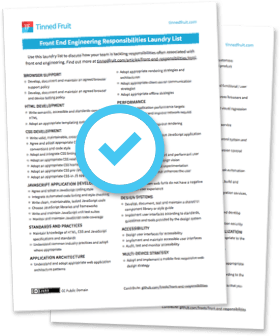Tinned Fruit Missives March 2017
Tinned Fruit Missives March 2017
Hi! Here is another bunch of hand-picked and lovingly curated artisanal hyperlinks about the business and strategy of front-end engineering, along with some associated waffle.
The hidden underlying theme this month seems to be about reminding ourselves to focus more on helping users and less on naval-gazing about tooling. I love this industry, but arguing about the right people using the right tools in the right way takes up too much of our energy. If my barber just griped about scissors the whole time I would find another barber. Instead he talks hilariously about Scottish caravaning and caravaners. So I guess the moral of the story is stop worrying about the caravan and enjoy the journey…?
– Jim
Tools for Radicals - Justin Falcone
https://hackernoon.com/tools-for-radicals-73b7cbbfc276#.75fweba6w
Justin takes a deeper look at the spat about “real developers” that seems to rear it’s ugly head in different forms every so often. I enjoyed the discussion of reactionaries vs. radicals in this post, and his own determined pursuit of a path right down the safe middle. My own luke-warm-take on tools is that there isn’t any one person or organisation who decides how you should make websites. The web is better for that. Ages and ages ago, I wrote a little about the dangers of professionalism for web professionals.
Your Engineering Team is not an Island - Alexander Grosse
https://medium.com/scaling-teams/your-engineering-team-is-not-an-island-success-demands-a-holistic-view-of-the-business-bccd6116094b#.v0p6el3fj
Growing a software company beyond one team of plucky developers is a tricky business. The modern trend is to create parallel ‘cross-functional delivery teams’, which is agile consultant-ese for small self-contained teams with the right mix of skills to take complete responsibility for a product or part of a product. This isn’t done for efficiency, though, it’s to keep everyone in an organisation in touch with users and their needs. Front-end developers have an important role in this, as they are so often a bridge between product vision and technical execution.
Parallel Engineering Efforts - Eliot Horowitz
http://www.eliothorowitz.com/blog/2017/02/15/parallel-engineering-efforts/
So many software projects are run on the unspoken assumption that there is only time to do it once. If you make the wrong technology choices, bad luck. Ship it and move on. We’ll fix it later. Part of this comes from a lack of understanding of software development practices, but we also have this weird idea that code as too precious to throw out, or we’re scared of offending the person who wrote it.
In this article, MongoDB’s CTO suggests various ways of running parallel efforts for experimentation, learning and validation. I’m lucky enough to be helping a product team take a similar learning approach to some front-end technology at the moment. Making this work requires high levels of trust and autonomy, but I love the way it targets both short-term and long-term benefits. Parallel efforts are particularly suitable for front-end-heavy product work, where feedback loops can be shorter.
The latest from Tinned Fruit
A Front-End Responsibilities Laundry List
https://tinnedfruit.com/2017/02/10/front-end-responsibilities.html
I needed a tickle list of things that web product organisations should be thinking about when it comes to front-end engineering (performance, accessibility, security, etc.) but was surprised that nothing quite like this exists. So I put together this laundry list on GitHub for my own and others’ benefit. I hope you find it useful for you own projects and team. And please submit pull requests for the things that I’ve inevitably missed or got wrong.
Some other World Wide Web hyperlinks I have enjoyed this month
- Ship Small Diffs - Dan McKinley
- Our Big Frontend Plan Revealed - GitLab
- Maintaining Accessibility in a Responsive World - Scott Jehl
- Code Smells in CSS Revisited - Harry Roberts
Tinned Fruit Missives is a monthly newsletter published by Jim Newbery, a front-end engineering consultant from Edinburgh in Scotland.
